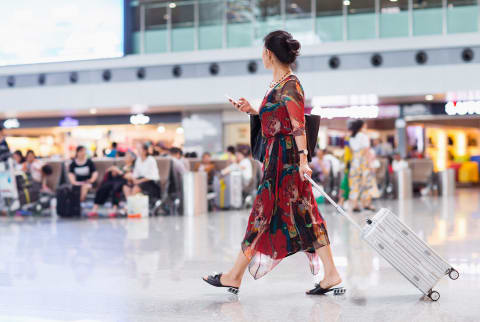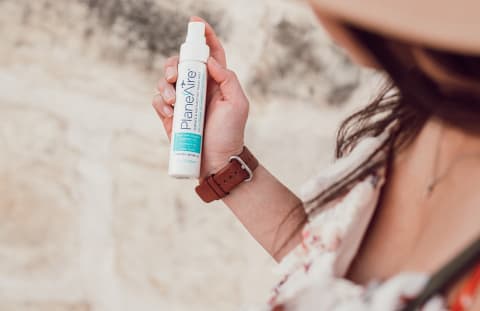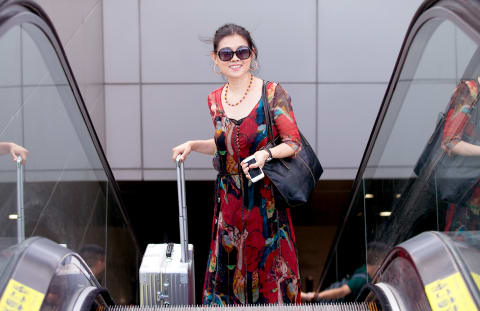Advertisement
When We Travel Again, Here’s How To Do It Safely

While many of us may not be traveling as much right now, practicing proper hygiene and taking the right precautions if and when we do—whether we find ourselves on a plane, a train, or just walking through the neighborhood—is always the goal.
We spoke with Ruth Carrico, Ph.D., DNP, ARNP, a fellow of the Society for Healthcare Epidemiology of America and a published researcher and certified expert in infectious disease prevention and control, to find out the must-do's and please don'ts for traveling as healthy as possible. (And remember, our most reliable source for healthy travel recommendations at this time are the CDC and WHO).
What's the risk with air travel?
According to Carrico, air travel presents a few unique situations that can enable or facilitate illness. "Altitude is dehydrating, so that minimizes the protective barrier in our airway. We can all relate because we feel dryness in our nose, mouth, and skin."
On top of that, "close contact with others as well as physical contact with shared surfaces—tray tables, armrests, bathroom surfaces—may harbor organisms that contaminate our hands when we touch them," she adds, "then those same hands touch our faces, eyes, mouth, nose. If our hands are unwashed, we make the movement of microbes on these surfaces quite easy."
That's why a surface and air-purifying mist like PlaneAire® can come in handy while flying. This carry-on-size mist is made using six certified organic essential oils known for having antibacterial, antiviral, and antimicrobial properties (lab tests show PlaneAire® eliminates over 99.99% of surface bacteria), as well as organic fruit-acid-derived ingredients. Instead of leaving behind a chemical-laden odor, this mist refreshes your surroundings on board with a vibrant, herbal scent—think peppermint, lemon, lavender, oregano, rosemary, and thyme.

Is it possible to boost our immune system before a flight?
"Not really," says Carrico, but here's why we shouldn't panic: When we're healthy, she explains, "our immune system is well equipped to protect us. And there are things we can do to help prevent contact with microbes and potential subsequent illness." Read on for the basic do's and don'ts.
Do's:
- Hydrate prior to travel by drinking plenty of water.
- Wash your hands with soap and water after using the restroom and intermittently for at least 20 seconds (or use an antibacterial hand sanitizer if soap isn't available).
- Use an environmental surface and air disinfectant to spray and wipe down the areas around you that you're likely to touch, including tray table and screens. PlaneAire® doesn't contain any synthetic chemicals, emulsifiers, preservatives, stabilizers, or surfactants, so shake it well before each use to activate the oils.
- Cover your mouth when you cough or sneeze, and immediately dispose of your used tissues (that might mean putting it into your own pocket or carry-on—not the seat-back pocket—until you find a trash receptacle).
- Use an antibacterial hand sanitizer after coughing and sneezing and periodically during travel. While PlaneAire® is not intended to be used as a hand sanitizer, its all-natural ingredients make it safe to do so, which means less to pack in your carry-on.
- Seated next to someone who's coughing? Consider asking the flight attendants if it's possible to move seats. "The greatest risk for transmission seems to be the area that includes that row, the two rows in front, and two rows behind that coughing person," says Carrico.
- If you feel more comfortable traveling with a face mask during a flight, "don't be shy wearing it," adds Carrico. "Just remember that the mask is a barrier between you and a coughing person, and that means the outside of it will become contaminated. If you touch the front the mask, wash or sanitize hands and avoid touching your eyes or surfaces around you. Once you remove the mask, it should be thrown away—don't save it for later."

Don'ts:
- Don't fly if you are sick, or if you're traveling with a sick child. "You are doing a grave disservice to others if you do," says Carrico. "If you are ill, contact the airline to see what flight change accommodations can be done." And if you're unable to reschedule your flight, "think about wearing a mask yourself."
- Don't store your used tissue in the seat-back pocket! Throw them out responsibly.
- Don't take prophylactic antibiotics to prevent illness associated with travel. On the other hand, "vitamin supplements are generally good and the fluids ingested along with them can be beneficial," Carrico adds, "although there is no data to support their benefit for preventing travel illness."
Remember, "a normal healthy immune system is able to protect us from illness associated with travel," Carrico says. "It certainly can happen, but the risk of 'catching something' during a plane ride is probably no higher than 'catching something' during a visit to the mall." Armed with her expert suggestions for healthy air travel, we'll take all the help we can get.
